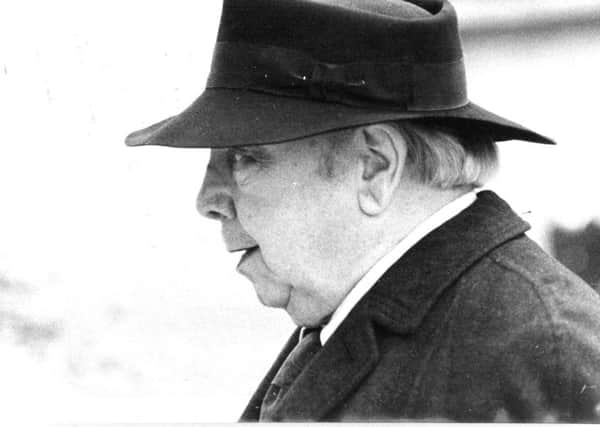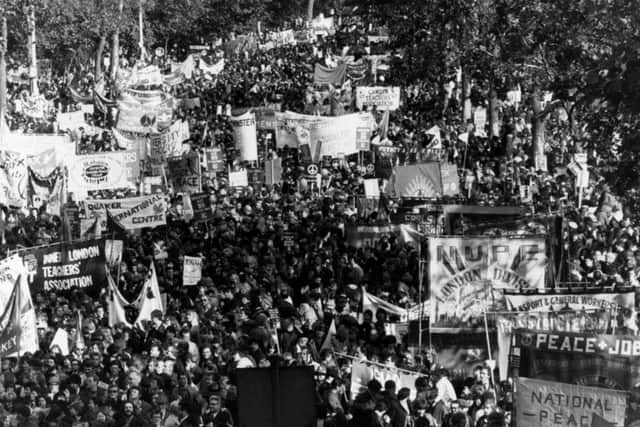Dave Webb: World ticks closer to nuclear midnight


Priestley’s article mentioned Anuerin Bevan’s speech at the 1957 Labour Party conference when, in reference to nuclear weapons, he asked delegates not to confuse ‘an emotional spasm’ with ‘statesmanship’. Priestley commented that “statesmanship of the last 10 years has produced little else but emotional spasms”.
Now, 60 years on, we find ourselves in a world where certain national leaders are exhibiting dangerous ‘emotional spasms’ including the threat to use nuclear weapons, whatever the consequences.
Advertisement
Hide AdAdvertisement
Hide AdUnfortunately, a misplaced understanding of ‘statesmanship’ has also resulted in successive UK governments retaining nuclear weapons as a symbol of power to replace a lost empire.


Despite signing the 1970 Nuclear Non-Proliferation Treaty, which commits all signatories to negotiate in good faith towards the cessation of the nuclear arms race and to nuclear disarmament, no real progress has been made.
In fact, Parliament voted in 2016 to spend over £204bn to replace the Trident submarine-based nuclear weapon system. And we are not alone – the United States is set to spend over $1 trillion on new nuclear weapons and the other nuclear weapons states are also upgrading their weapons systems.
More worrying, perhaps, is the fact that the new generations of nuclear weapons are being developed to be more than just a threat. They are being made more accurate and some will be smaller than previous versions, and thus more likely to be used. Nevertheless, their use will almost certainly escalate into a devastating exchange that the world will not recover from for centuries. The threats and counter-threats passed between President Trump and Kim Jong-un and the military build-up in South Korea, Scandinavia and Europe have moved us to two minutes to midnight on the ‘Doomsday Clock’ of the Atomic Scientists – the closest we have ever been to global catastrophe.
Advertisement
Hide AdAdvertisement
Hide AdAmong this madness, though, there are signs of hope. Inspired by the tens of thousands of members of the International Campaign to Abolish Nuclear Weapons (ICAN), many of the non-nuclear states established a treaty at the United Nations to prohibit the production, possession and use of nuclear weapons. CND has been a partner organisation of ICAN, working to remind people of the terrible humanitarian consequences of the use of these weapons.


A nuclear exchange would not only instantly kill tens of millions of civilians but also cause abrupt changes in the climate, leading to agricultural collapse and billions more dying from starvation. Although the nine nuclear weapon states refused to participate in the negotiation process, a majority of the rest, 122, agreed on the terms of the treaty last July and it opened for signatures in September. Working together, civil society and non-nuclear weapon states have given us a way forward, to ensure our survival.
However, the task is not yet complete. Some 15,000 nuclear warheads remain poised, ready to be used – each with an explosive power many times that of the bombs that devastated Hiroshima and Nagasaki, killing hundreds of thousands of people. The recently released US military posture review advocates using nuclear weapons, even in response to ‘significant’ non-nuclear attacks and nuclear weapons remain in the defence policies of all the main political parties in the UK except the Greens.
So, as governments return to traditional and ineffective methods of hard power, now more than ever we need to speak out strongly about peace building and the use of diplomacy, at which the UK excels. We are ideally placed to make a huge difference, we have only a few nuclear weapons compared with the US or Russia but, in the 60 year-old words of Priestley, although “our bargaining power is slight, the force of our example might be great”.
Advertisement
Hide AdAdvertisement
Hide AdWe need the courage to take the first step and set an example by scrapping the Trident programme. It might not be easy but as Priestley added: “Getting out of the water may be difficult, but it’s better than drowning.”
Dave Webb is Chair of National CND. He was previously Professor of Engineering, and then Professor of Peace & Conflict Studies, at Leeds Beckett University.